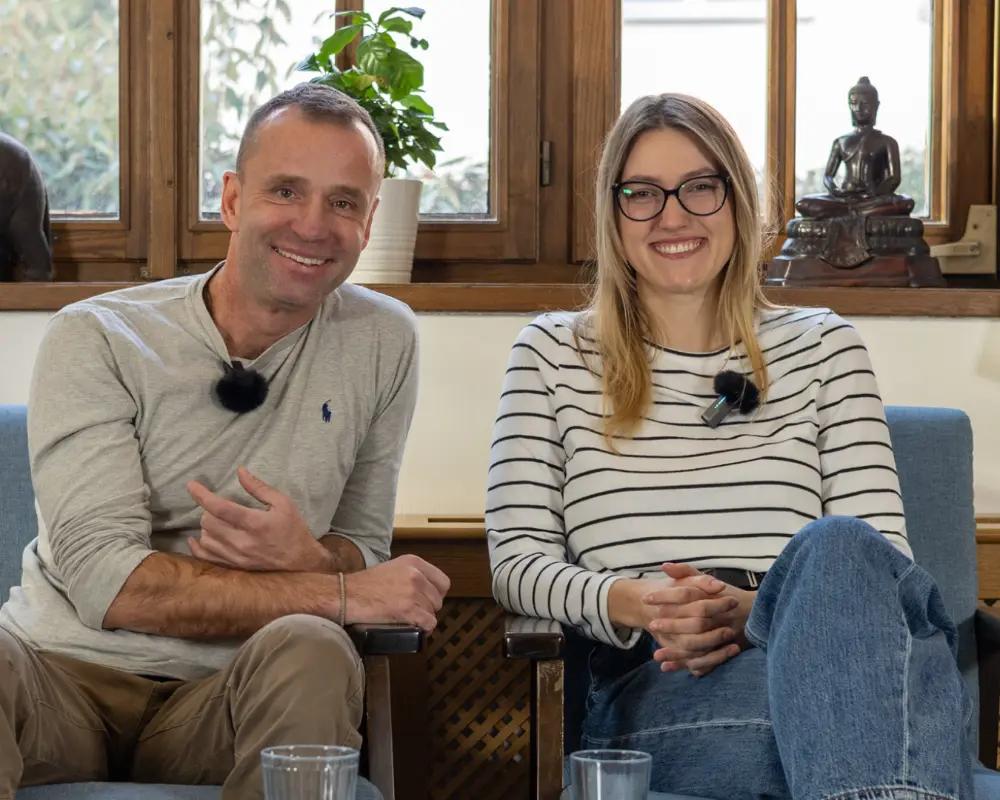How companies are finding a way to prevent burnout: the experience of an HR manager from the WPJ agency
Therapists at NEO Center have prepared the first workshop for human resources experts on the topic of burnout. The topic is increasingly appearing among our clients. According to initial feedback and experience, most companies in our country are just trying to grasp the topic and work properly with their employees, while the more progressive ones are starting to cooperate with experts. HR specialists are the closest to employees. One of them is the digital agency WPJ – e-commerce specialists who create e-shops on their own platform WPJshop. Josef Špiroch, the company's HR manager, also participated in the workshop.
"I too have experienced burnout in the past, the process from the first symptoms, when I noticed something was happening to some "action" leading to a way out of it, took almost a year. There were many manifestations both in work and later in personal life. Today, all of this is an experience that makes me understand the importance of the topic. One thing I would do differently, namely not being afraid to contact a specialist in a timely manner."
He went through burnout, and today, thanks to his own experience, he understands his colleagues better as an HR professional.
You attended a workshop on burnout with our experts. So at WPJ, you emphasize the prevention of burnout among your employees and stress management in general. How do you perceive this in your work?
At the moment, I cannot say that we at WPJ have clearly set processes in the area of prevention, but as a company we perceive burnout as a very important topic that should not be underestimated in relation to the work and personal lives of each of us. The term “burnout syndrome” is used by practically everyone today, whether rightly or not, and this was one of the reasons for my participation in the workshop. To obtain information directly from experts with real experience and ideally get answers to questions such as: What exactly is burnout syndrome and how does it manifest itself? How to recognize the first symptoms? How to ideally prevent it? Based on this information, evaluate everything and set the next steps for the company.
So you don't have a direct corporate concept yet, but you understand the topic. Does this mean that you have probably had to deal with a personal situation before?
I wouldn't say they necessarily have to, but in several cases we have touched on this topic or something similar and it made sense for us to offer the possibility of using an online session with a therapist or a consultation with an expert from the NEO Center. Thanks to these examples, it is likely that we as a company will want to establish some form of cooperation with experts in the future.
Do you have experience with HR and working with employees? Do you perceive a shift/increase in the issue of burnout over time?
I understand it 100% of the time. When I think back and go back 10-15 years, I was practically unaware of the term “burnout syndrome”. Today it is an integral part of the vocabulary of most people around me, whether in relation to them or towards their loved ones. It is not just a matter of wordplay, but more and more often I receive information about someone from my environment who is struggling/has struggled with burnout problems or is starting to. On the other hand, I also perceive more awareness of this topic in the media and online space, with more and more experts pointing out this topic and prevention.
Have you ever had an experience where an employee's burnout directly affected the team or the company?
I have experience, and even my own, which is from my previous job, when I decided that it would be best to quit after about eight years and make a change due to burnout. I have often said in the past that I think I was starting to develop burnout syndrome (my idea of the syndrome was that the symptoms had to be much more intense), but today, based on the information from the workshop, I can say that I really went through some form of burnout. And did it affect the team or the company? For me, 100 percent. How much, that would be a question for someone else from my work environment at the time, but for myself I can say that in addition to the everyday mood, which was certainly often not worthy of a manager who is supposed to lead people and lead by example, of course my efficiency, desire for any activity, creativity, and effort to move things forward and, above all, to finish the job, significantly decreased. Furthermore, apathy, procrastination, and apathy towards simple constructive criticism during regular meetings increased, as did my reluctance to communicate with anyone, and I could go on. The process from the first symptoms, when I noticed something was happening to me, to some “action” leading to a way out, took almost a year. There were many manifestations both in my work and later in my personal life. Today, all of this is just an experience that makes me understand the importance of the topic. There is one thing I would do differently, namely not to be afraid to contact a specialist in a timely manner.
Do employees contact you themselves with the idea that they are experiencing increased stress or burnout, or do you recognize it yourself?
Not yet, but as a company we are still trying to understand how to approach this whole topic from our side, so the team hasn't had much time to do that. In some cases, we will come across this or a similar topic in joint interviews. If something deeper is really going on, it can often be seen from the outside.
Do you think there is still stigmatization of mental health among us?
I can certainly see a huge shift for myself. The reasons can be debated, but for me it is greater awareness of the field, digitalization / the emergence of online therapy. Globalization, when the Western trend is reaching us, where some forms of sessions (therapy, coaching, etc.) have been part of society for a long time, but most importantly, many people already have some experience, either their own or from their surroundings. On the other hand, I still see a certain stigma here. It seems to me that when I talk to someone about the topic in general, everyone agrees that it is something completely normal. Everyone sometimes needs to talk to someone, get direction, etc., so it is nothing to be ashamed of today. However, when it comes to a specific person who should address their own mental health in this way, they are often reluctant to take the first step and book a session. Meanwhile, if we were talking about the flu, the person would have long ago been to the doctor to prescribe them pills for relief.
Based on your experience, do you think today's employees are spoiled? Is it true that young people want to work less, or are they just looking for more work-life balance?
The million dollar question :), which I have asked myself several times. A few years ago I would have answered unequivocally yes, they are spoiled. Today I would not have such a resolute opinion. If we are not talking about someone who is a workaholic by nature, for whom work is everything, but we are talking about the majority who have a personal life in addition to work (family, friends and hobbies), then logically yes, everyone would want to work less and we do not have to talk only about the "young". Compared to the recent times, which I, born in 1988, did not experience much, today we have so many options for spending our free time (sports, traveling, experiences, etc.), that even if we had all the time and unlimited capital, we would probably not be able to do everything we would like in our lives, especially if we have to cut some of that time for our work. For me, this is the main reason that is most associated with the emerging GEN Z, who wants to experience and discover more. On the other hand, someone still has to produce some work for our hobbies, and we are reaching a limit that will be perceived differently in each company. It is then about each individual. Someone knows what it means to work hard, is able to do a lot of work in relatively less time and devotes the remaining time to their personal life. Then it is fine for me and there can be no question of any pampering. But there are also those who, for example, have not experienced much work or hard work in their lives, have a distorted idea from movies, social networks, etc. of what constitutes a working standard in terms of environment, benefits, but also commitment and performance.
Do you have any recommendations for HR colleagues? Should they address the issue or leave it up to the employees themselves?
Definitely yes, definitely deal with it. It may look different in every company, depending on the size of the company, the given possibilities, the budget, but there is definitely something that can be included everywhere. It doesn't have to be just about the company paying for the therapy session. That is ultimately one of the last solutions. But often it is enough to be in contact with people, observe how the mood changes, have fun with them. Often a person is already thinking about professional help in their head, but they are afraid to take that last step, they need someone to push them. We apply all of this to the environment in the company, but an integral part of preventing burnout is also having a balanced personal life. It's not just about the employer, but I have to have the right habits in my personal life to eliminate stress as much as possible. And here we are talking about diet, sleep, activity, exercise, etc. In particular, the area of activities and exercise is something in which we try to support our team with company benefits.
Why caring for psychological resilience belongs in modern companies — comment by PhDr. Kateřina Marklová, expert director of the NEO Center
Research on the topic of preventing burnout syndrome in Czech companies corresponds to my clinical experience. Companies still approach psychological help with embarrassment, when they are already interested in coaching aimed at achieving the highest possible performance. At the same time, employee performance can be influenced by the prevention of psychopathological phenomena in the sense that a satisfied and well-anchored employee performs well in the company and does not leave for the competition. To use sports terminology, it is like trying to get the most out of my team, to lead them to victory in matches, but I am not actually interested in their personal life, studies, or lifestyle. At the same time, these may be the variables that prevent the entire team from moving towards better performance (although it may concern one or two players, it will affect the entire system). Burnout syndrome occurs when we focus on only one area in life (most often on the performance component) and forget that we need to have rich resources from which we draw energy. The so-called psychological resources include functioning family relationships, fulfilling leisure activities, good friendships, meaningful activities, functional coping strategies, good communication skills (so-called soft skills), etc. Unfortunately, I have experience that these topics are not that popular in some companies because they do not bring an immediate effect or this area is taboo (private problems, let alone psychological difficulties, are not discussed, everyone has to solve them for themselves). However, I believe that the topic of psychological resilience and prevention of psychopathological phenomena belongs to modern companies of the 21st century.
PhDr. Kateřina Marklová
Professional Director of the NEO Center, Clinic Director, Clinical Psychologist, Psychotherapist
Photo: Kinga Howard - Unsplash.com
Contact usBE IN THE IMAGE
Information, articles and news
Do you need help?
You can send us a message or call us every day from 8 a.m. to 8 p.m. +420 228 226 101
This website is using cookies
You can either allow them all with the "I agree to all" button below, refuse or set the "Detailed settings" in detail. You can also change the selection later. More information about cookies in the Cookie Policy .




